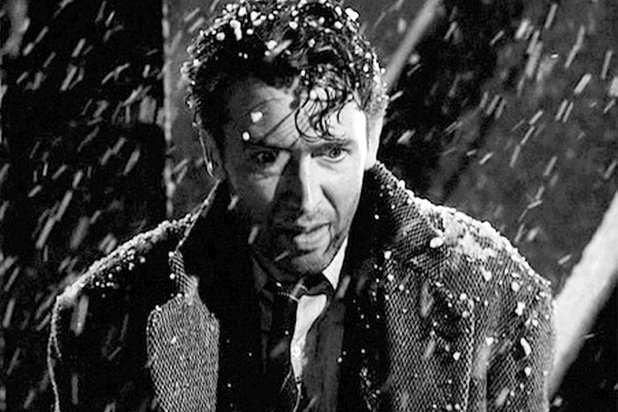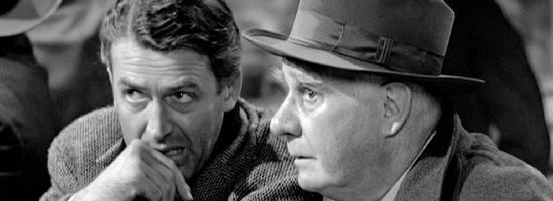Read only if you’ve watched IAWL. If you haven’t, RUN TO DO SO.

I’ve discovered It’s A Wonderful Life as a 10 year old (as part of my Jimmy Stewart crush) and it has remained one my most affecting all time favourites. This is perhaps a rather obvious statement for anyone living in a country big on Christmas. But you see, I grew up in Israel, as a very atheist Jew with an aversion to all things religion, especially the kind that shoves itself down your throat.
So what was it about this film with angels and prayers that resonated with me? What is it that makes this universally loved by people of all religions and lack thereofs?
Well, the short answer is George Bailey. It is a long and patient character study of a really nice chap, portrayed to perfection by the wholesome king of all things gangly, Jimmy Stewart. But the real affecting power of George Bailey’s character lies deeper than his obvious likeability, his charming romance with fierce queen Merry (Donna Reed) or our intimate acquaintance with him.
It’s A Wonderful Life is an elaborate adaptation of Charles’ Dickens A Christmas Carol:
Scrooge, A lost man, gets a spiritual visit on Christmas eve and is shown the error of his ways. By the end of the night he is a changed man. Woke. Aware of his privilege and his communal responsibility.
Dickens may not have invented Christmas with it, but he certainly turned the idea of the holiday charity into a coherent socialist blueprint.
What Wonderful does is to flip the defining Carol narrative on its head.
George Bailey is Scrooge. But instead of making the lead character a villainous anti-hero, as the source material does, they turned Scrooge into a hero. Not in any need of changing his ways, but in opening his eyes to his own value.
What fascinated me as a kid (and to this day), was the fact that George Bailey struggled. Not at doing good, but at being that. As if he was cast as the protagonist in a tale he didn’t choose and saw no rewards or an end to the part.
Never before have I seen a hero so bitter about being one.
Oh, we are used to tales of reluctant heroes who start off as self serving then rise to the occasion and do the right thing to save the day.
From the get go, however, George Bailey repeatedly does the right thing… and he is not happy about it.
As a kid this was a cinematic revelation. Finally, a Hollywood film being honest about this! Goodness is not something that comes instinctively, it doesn’t flow smoothly out of you without a thought. It is an endless series of painful, very active, choices.
In fact, Bailey is consistently “punished” for his good deeds. From a very young age, little George is taught by life that being good comes at a real personal price. He loses his hearing to save his brother, he gets smacked around to save Mr. Gower and his patient, he gives up his travels, his college tuition and his honeymoon savings to provide affordable homes for the people. His latest solution for saving uncle Billy and the Building & Loans is sacrificing his life.
At least Jesus only paid once for your sins! (Sorry. Too soon?)
The fact George was perpetually bitter, angry and prone to outbursts was refreshing because I knew it to be true from my own experience. It’s some of human existence’s greatest most sobering hits: Life is unfair. Wicked people go unpunished. Good people die young or in debt. There’s no cosmic justice.
And here was good old George, thinking he’ll never get his due gratitude, aware of his wasted aspirations, still insisting on doing the right thing, time after time after time. Being good for goodness sake.

Only once we’ve gotten to know George, an hour and a twenty minutes in, we get the plot device that completely transforms the film and shifts genres (from romantic dramedy into fantasy horror): Clarence, the angel sent form heavens, acting as the ghost of Xmas alt present, administering some serious shock-therapy.
The device, in which George gets to see how life would be like without him, might be elaborate, but its aim is simple: to show George he is needed. Communally speaking, other people’s world is better with George in it (Not only on a communal level, but on a cosmic one too! Even Clarence himself needs George to save him from his wingless existence!).
Yet somehow, despite the fact Wonderful deploys a freaking angel to fix the situation, the move doesn’t register as much of a divine intervention.
One reason is that the film has an honest conversation about George’s suicidal and relatable inner darkness. Good people if they’re not careful with their sacrifice can end up killing themselves… or turning into an Ebeneezer Scrooge.
But ultimately the main reason is the fact that even here in this fictionalised world, god is the same absent dickhead he’s always been in real life.
Clarence does not set out to retroactively right all historical wrongs, revive papa Bailey and win George the lottery. There is no talk of the sweet deal he’ll get in the afterlife. Nor any punishments, for that matter.
Mr. Potter, the actual bona fide Scrooge in this tale, does not see the error of his ways or lose his power.
If you want miracles, the film deftly reminds us, don’t count on deities. You have to perform them yourself. Between frozen lake heroics to the magic of the honeymoon-kitty, heaven sure does rely on George to do all the miraculous heavy lifting in Bedford Falls… while god sits in the sky watching documentaries.
And the only real *Christmas* miracle? That comes from the community itself, setting out to save one of their own. The miracle isn’t the act of turning George invisible so he can understand his impact but actually, the community showing George that they see him. And they didn’t need an angel to perform that, just badass Merry.

It’s A wonderful Life is a reflective piece. It talks about cinema’s role in helping us understand our place in the world, make sense of our life by framing it in narratives.
God uses the film of George Bailey’s life to educate Clarence about the subject, but us too. As we relate and identify with George, we ask ourselves are we the angel? Are we George? Are we both?
Then the film sends the plot into an alternative reality that we know viscerally to be wrong. We are reminded of George’s importance… but also by proxy our own worth. That’s why the cinema house is the first building George wishes a merry Christmas as he’ runs back into town and life.
Being good isn’t natural, it’s a continual choice. And it’s a hard thankless punishing one at that. In a world devoid of divine interventions or justice, what we good people have is this film. Here to remind us it sees us, even if no one else does, and that we matter.
